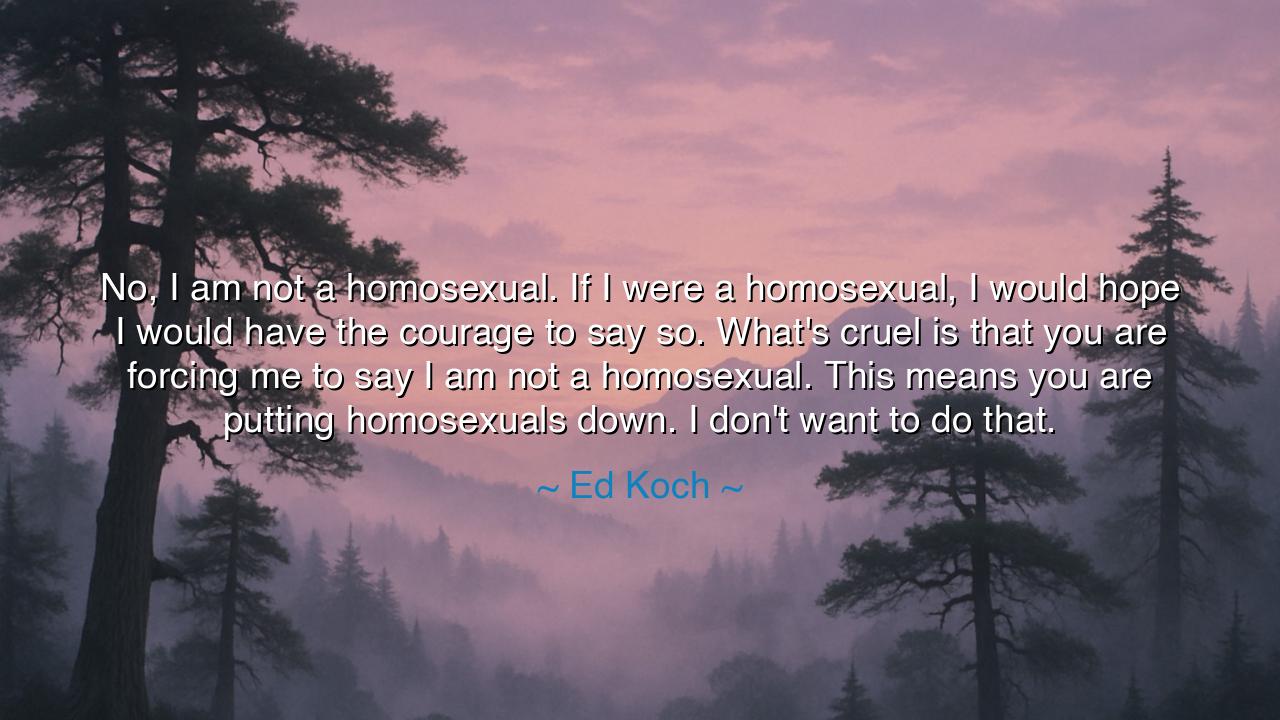
No, I am not a homosexual. If I were a homosexual, I would hope I
No, I am not a homosexual. If I were a homosexual, I would hope I would have the courage to say so. What's cruel is that you are forcing me to say I am not a homosexual. This means you are putting homosexuals down. I don't want to do that.






“No, I am not a homosexual. If I were a homosexual, I would hope I would have the courage to say so. What’s cruel is that you are forcing me to say I am not a homosexual. This means you are putting homosexuals down. I don’t want to do that.”
Thus spoke Ed Koch, the former mayor of New York City, a man of bold words and fiery conscience, who lived in an age when identity itself could be used as a weapon. His declaration is more than a denial—it is a defense of dignity, of truth, and of equality. In these words, Koch exposes the hidden cruelty of prejudice: not merely in how it treats those who are different, but in how it compels others to distance themselves from the oppressed, as if to affirm their own worth by disavowing another’s. His statement burns with moral clarity—the conviction that to deny with shame is to participate in the oppression of others, and that silence in the face of injustice is a wound upon the soul.
In his time, rumors about Koch’s sexuality were used not to seek truth, but to wound—to sow suspicion, to shame, to divide. Yet, rather than merely protest his innocence, he chose a higher path. He declared that even in defending himself, he would not demean those who were the targets of prejudice. It was a moment of deep integrity, when one man stood against the poisoned logic of society: that to be different is to be lesser. His courage lay not in denying the accusation, but in refusing to betray compassion for the sake of his own reputation.
This wisdom is not new; it is the same truth spoken by the sages and heroes of old. Recall Socrates, who stood before the Athenian court, accused of corrupting the youth and dishonoring the gods. He could have saved himself with a lie, with submission to the opinions of men—but he refused. “It is better to suffer wrong than to do wrong,” he said, for he knew that the corruption of the soul is the greatest punishment of all. Likewise, Ed Koch refused to protect his image at the expense of truth and kindness. He would not feed the fire of hatred, even to save himself from its heat.
The cruelty that Koch names is subtle and enduring. It is the cruelty of a world that forces men to prove their “normality” by denying solidarity with those condemned as “other.” It is the cruelty that turns difference into a weapon, that tempts the strong to preserve their safety by abandoning the vulnerable. To reject that cruelty, as Koch did, is to practice a higher form of courage—the courage of empathy, the courage to stand beside the scorned and say, “Their dignity is my own.” For in truth, the measure of a person’s nobility lies not in their conformity, but in their compassion.
In speaking thus, Koch revealed a wisdom that transcends politics. He understood that the chains of prejudice bind both the oppressed and the bystander. The one is imprisoned by fear; the other by cowardice. Only truth, spoken with love, can break both. His words call to each of us across the ages: when confronted with the choice between acceptance and righteousness, choose righteousness—even if it costs you favor or peace. For peace built on fear is no peace at all.
This teaching finds reflection in many hearts and histories. Consider Harvey Milk, the first openly gay elected official in California, who stood before the world and said, “Hope will never be silent.” He lived—and died—for the belief that openness is the seed of freedom. Koch, though not of the same struggle, recognized the same moral law: that to speak truth without cruelty, to reject hatred without hatred, is the foundation of justice. Both men remind us that courage is not always in battle—it is often in the refusal to betray compassion.
Let us, then, draw from Koch’s words a lesson for our own lives. Whenever the world pressures you to prove your belonging by turning away from the marginalized, remember that such “proof” is corruption. Stand firm in your humanity. Refuse to let others’ fear become your own. Speak gently, but speak truth. Defend others even when you are not among them, for the cause of one is the cause of all. In such acts lies the essence of moral strength—the triumph of conscience over conformity, of love over fear.
And so, dear listener, remember: courage is not only the power to declare who you are—it is the grace to honor who others are. The cruel will always demand denial; the wise will always choose empathy. Follow the path of the wise. Let your words, like those of Ed Koch, be firm yet kind, humble yet unyielding. For in standing for others, you rise above illusion—and in defending the dignity of all, you preserve the sacred truth of your own soul.






AAdministratorAdministrator
Welcome, honored guests. Please leave a comment, we will respond soon